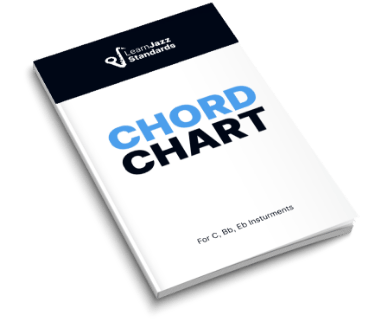The tritone substitution is a very important harmonic device in jazz music. This technique adds color and tension to your jazz improvisation and spices up jazz harmony while keeping the function of the chord progression intact.
If you listen to jazz, you have definitely heard a tritone substitution in action. However, you may not know what it is or why it works.
In this post, we’ll define what a substitute dominant is and discuss three different harmonic situations where you’ll likely encounter a tritone substitution in jazz music:
- Tritone Substitution of the V in a ii-V-I Chord Progression
- Tritone Substitution of the VI in a I-vi-ii-V Chord Progression
- Tritone Substitution of the ii in a ii-V-I Chord Progression
Then will discuss different scales you can use over tritone substitutions when improvising. We’ll also include listening examples to hear tritone substitutions in action.
Whether playing jazz guitar, jazz piano, or even a non-chordal instrument, you must know how to navigate a tritone substitution when comping or improvising. If you feel your jazz theory chops could use a little polishing, you should check out the Learn Jazz Standards Inner Circle.
There are over ten years of educational materials, invaluable backing tracks, in-depth jazz standard studies, and instrument-specific accelerator courses to help you get your jazz playing where you want it to be.
Want to improve in 30 days or less? Find out how the Inner Circle can get you there.
Table of Contents
What is a Tritone Substitution?
Before we dig into tritone substitutions, we should probably define its constituent parts:
- tritones
- (chord) substitutions
What’s a Tritone?
A tritone is an interval of three whole tones (tri) between two notes. It can also be thought of as a #4 or b5 from a root note.
Example: C to Gb
- Gb (or F#) is a tritone away from C, and C is a tritone away from Gb.
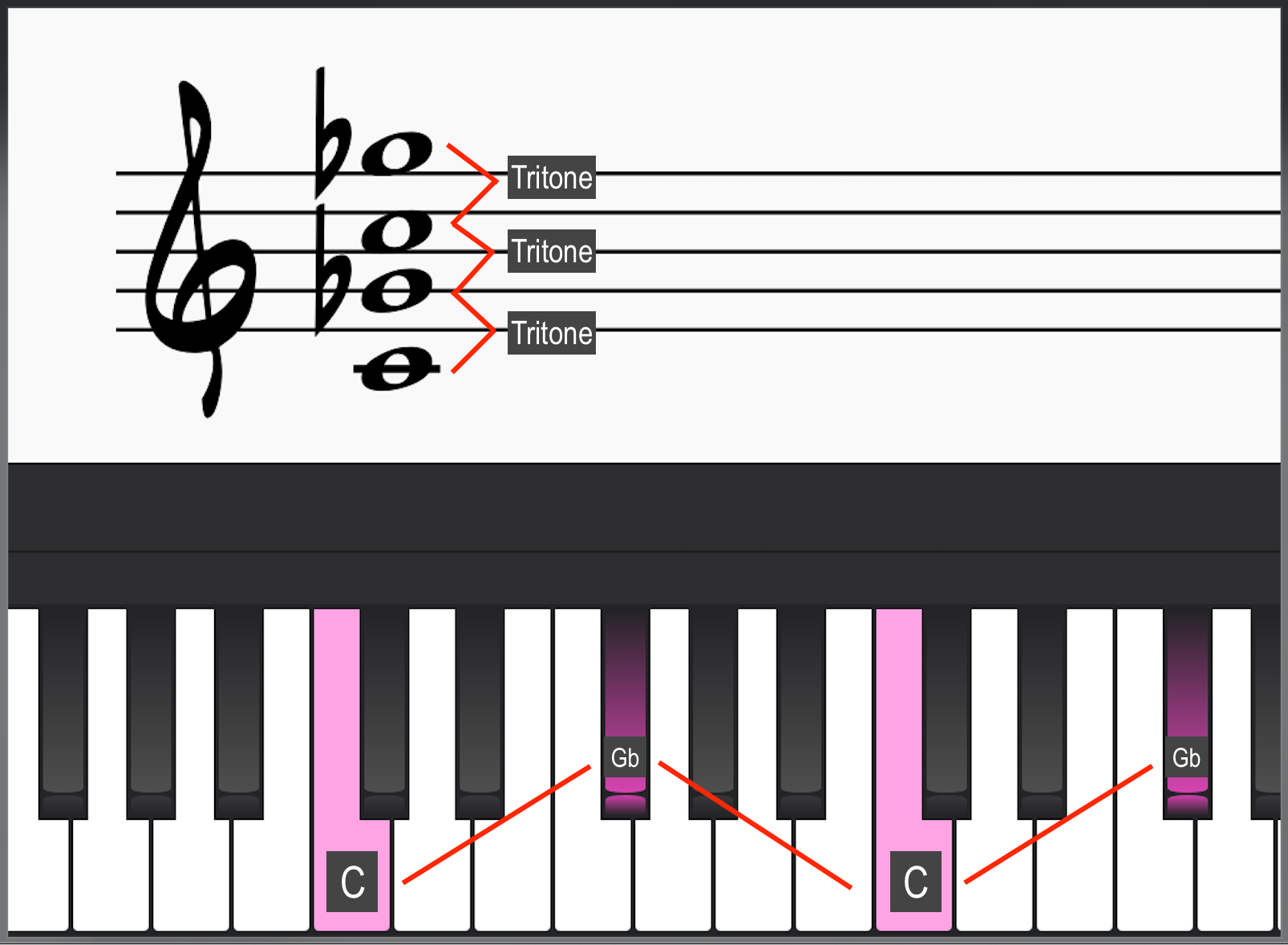
As a jazz musician, you want to be able to identify tritones and other intervals by ear…
Our Ear Training 101 Test can test your ability to identify any note and teach you the basics of interval ear training. You can also check out this article on musical intervals to learn more about musical intervals and how to identify them.
What’s a Chord Substitution?
A chord substitution is a musical technique in which one chord is replaced by another chord that has a similar function in a chord progression but provides a different harmonic color or interest.
The purpose of chord substitution is to add harmonic variety and interest to music, and it’s a technique that requires a solid understanding of music theory (particularly chord functions and key relationships).
There are several types of chord substitutions in jazz theory:
- Diatonic Substitutions: When you replace one chord with another chord from the same key, you are using a diatonic substitution.
- If you replace a C major (tonic chord) with an E minor chord, you are using a diatonic substitution. This works because the notes of an E-7 chord (E-G-B-D) form a rootless Cmaj9 chord (C-E-G-B-D).
- Secondary Dominants: Secondary dominant chords temporarily tonicize another chord (besides the tonic chord) in a chord progression.
- When you see a string of dominant chords like [E7 – A7 – D7 – G7 – C], each dominant chord is tonicizing the next chord in the progression. E7 is the V of A7, which is the V of D7, which is the V of G7, and so on.
- Modal Interchange: Modal interchange or borrowed harmony is a harmonic device where you borrow a chord from a different mode or scale that shares the same root with your key center.
- Usually, musicians borrow chords from the parallel minor or major key. If your key is C major, but your chord progression has an F-7 followed by a Bb7, you are borrowing chords from the parallel minor key of C minor (iv – VII).
- Tritone Substitutions: That leaves us with tritone substitutions! We are going to get to the specifics of how and why this works, but an introductory definition would be replacing a chord with a dominant chord a tritone away.
For more on the types of substitutions used in jazz music, check out this article on five types of chord substitutions. And, check out this article if you want to really dig into modal interchange.
We now know what a tritone interval is and what chord substitutions are, so let’s combine them.
What’s a Tritone Substitution?
As we mentioned earlier, a tritone substitution occurs whenever a chord is replaced by another chord whose root is a tritone interval away.
Example: G7 is replaced by Db7.
In practice, a tritone sub in jazz music is most commonly a dominant chord. This doesn’t mean you can’t substitute other chord qualities, but a dominant chord is most often the chord of choice.
Why Do Tritone Substitutions Work? …Guide Tones!
When you replace a dominant chord with another dominant chord a tritone away, the essential chord tones in each chord are the same. Tritone subs have the same guide tones as the chord it replaced.
Guide tones are the notes in a chord that help define its tonal quality. These essential notes are the 3rd and 7th scale degrees in the chord.
- The 3rd determines whether the chord is a major chord or minor chord.
- The 7th specifies whether the chord is a dominant chord or major/minor seventh.
Let’s look at the two chords from above—G7 and the Db7. Let’s start with the notes in G7.
G7 Dominant Chord
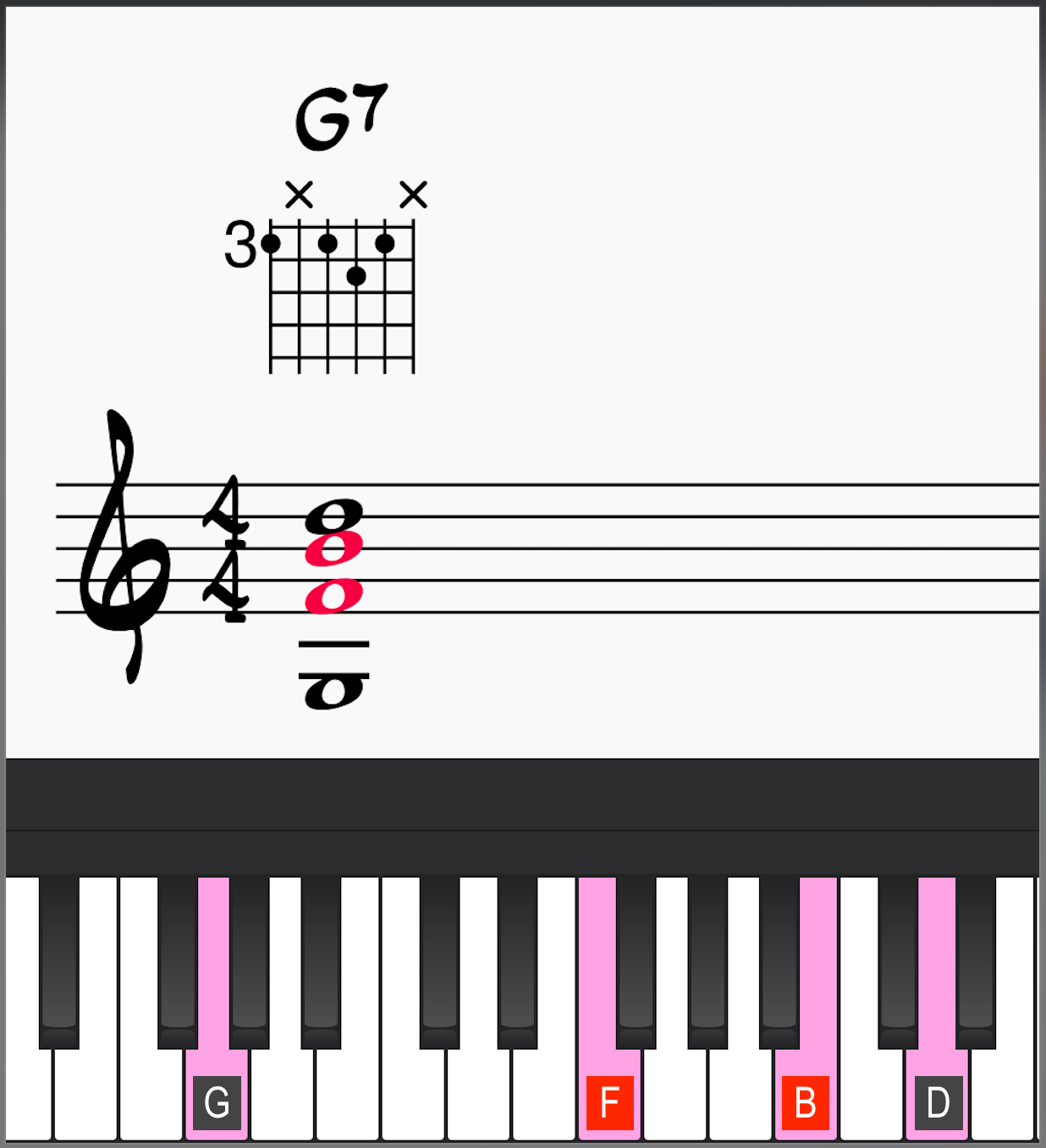
- 7th: F
- 5th: D
- 3rd: B
- Root: G
Db7 Dominant Chord
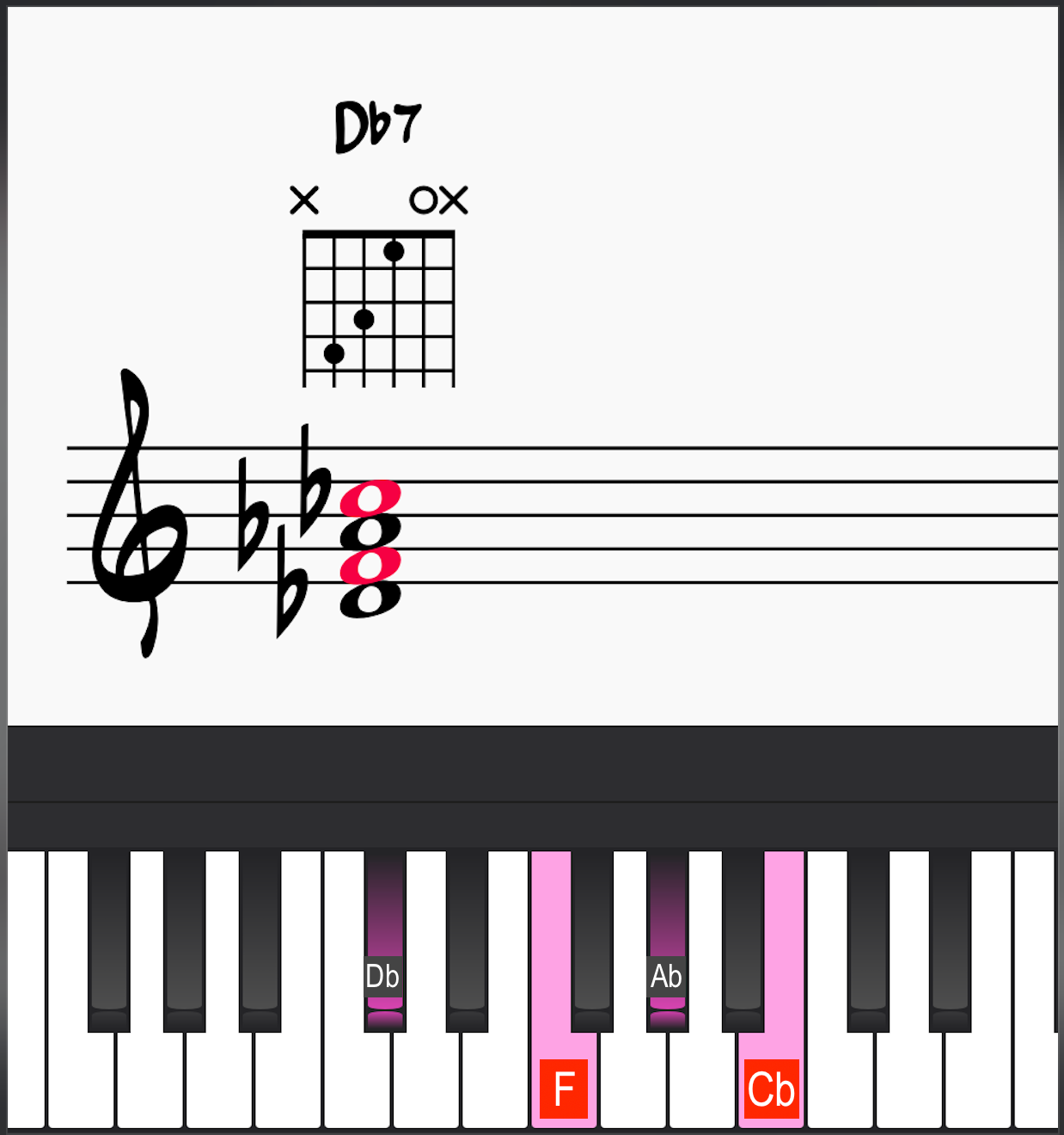
- 7th: Cb (B)
- 5th: Ab
- 3rd: F
- Root: Db
The 3rd of the G7 is a B, and the 7th is an F.
For Db7, the 3rd is an F, and the 7th is a Cb (or B).
Both chords share the same guide tones and, as a result, perform the same function in a chord progression.
But What About All The Other Notes?
You’ll immediately hear the tension of non-diatonic tones when you substitute a G7 dominant chord with a Db7 dominant chord. When we use a Db7 instead of a standard G7, we imply many altered chord extensions on the G7.
This creates the sound of a G7alt chord. What notes in Db7 create the specific altered notes of a G7alt?
- Db is the #11 in G7
- F is the b7 in G7
- Ab is the b9 in G7
- B is the 3rd in G7
You could add an extension to the Db7, such as the 9th. The 9th in Db7 is Eb, and what is Eb in the context of G7? It’s the flat 13th. This means the G altered scale is a great scale choice in this type of harmonic situation.
Here is a fully altered G7 chord with the notes of a Db7 chord colored in red:
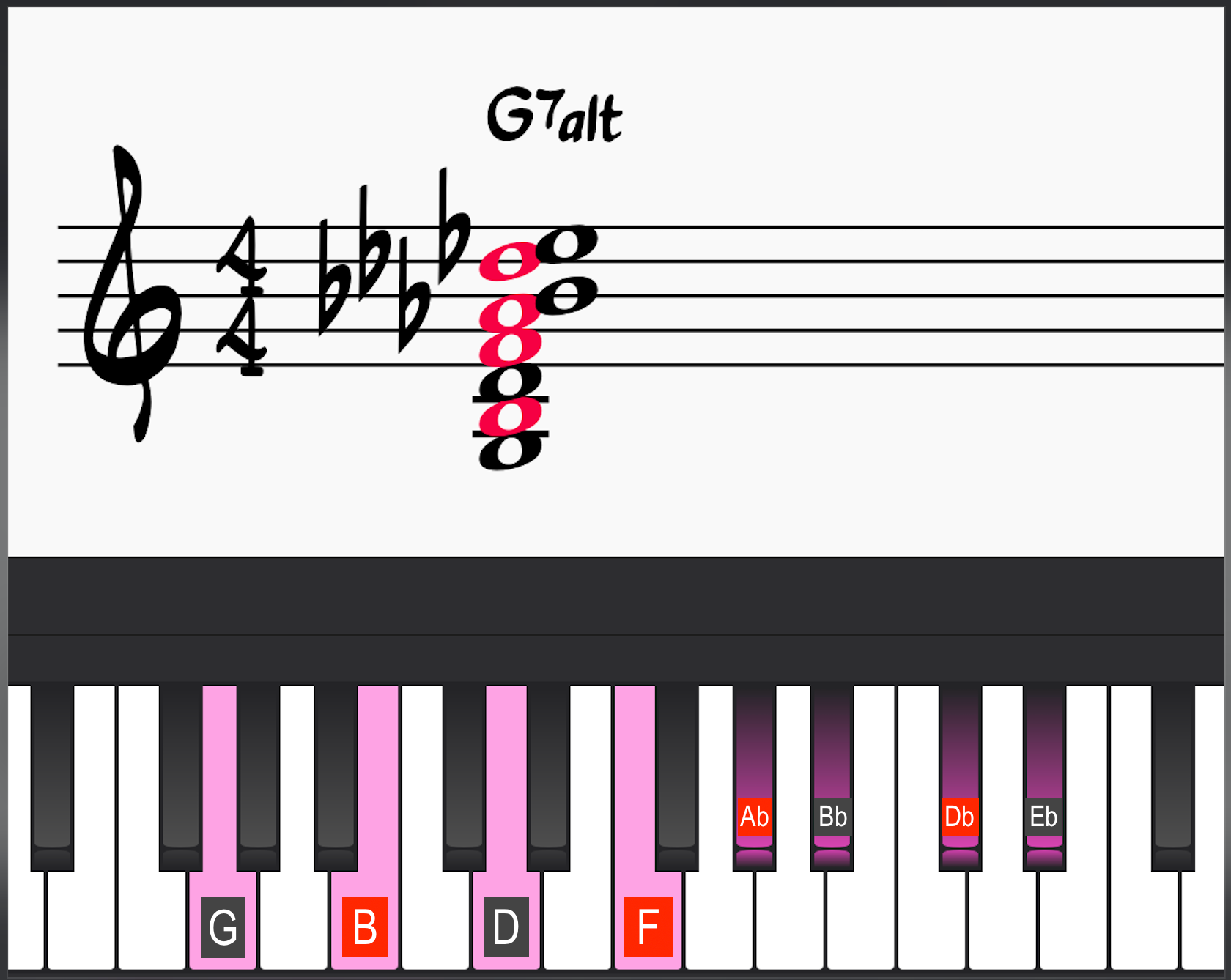
Okay, so we know what tritone substitutions are and why they work. Now it’s time to see these chords in action. Let’s jump into the tritone substitutions in jazz chord progressions.
For more on chord extensions, check out this article on extended and altered chords.
Tritone Substitution of V in a ii-V-I Chord Progression
The tritone substitution of the V chord is one of the most common chord substitutions used in jazz music.
The tritone substitution of the V chord usually occurs in a ii-V-I progression, where the V is replaced a chord a tritone away. Note how this creates chromatic harmonic movement between the ii chord and the tonic chord.
The root note of each chord moves downward in half steps.

Here is a lick you can play over this tritone substitution:

Tritone Substitution of vi/VI in I-vi-ii-V Chord Progressions
The tritone sub of the minor vi or dominant VI is less common than the tritone substitution for the V but is still fairly common. Like the other examples, this substitution is often written into the chord progression of tunes.
For example, George Gershwin’s jazz standard A Foggy Day uses particular substitutions in the first four chord changes.

Let’s look at the note relationships between the Eb7 and the A7. The Eb7 implies an A7alt chord.
In the next lick, let’s combine both tritone subs we’ve covered so far. You’ll notice the last lick we played at the end of this example:

BEFORE YOU CONTINUE...
If you struggle to play amazing jazz solos and want to learn the secret strategies the pros are using to improvise, our free guide will get you on the right track.

Tritone Substitution of ii in a ii-V-I Chord Progression
Another common tritone substitution occurs on the ii chord in a standard ii-V chord progression. Often, this happens in a minor ii-V-i scenario, but it can also occur in a major ii-V-I. The chord progression of the Cole Porter tune, Night and Day, is often played with an Ab7 instead of a D-7b5 chord.

The tritone sub of ii is often used in a minor blues chord progression. In honor of the mighty minor blues, here is a mighty minor blues lick you can play on the turnaround at the end of a minor blues chord progression.

5 Scales That Work Over a Tritone Sub
There are many ways to play over a tritone substitution.
In truth, you’d play over them like any other altered dominant chord. Let’s use an example from earlier—the Db7 as a tritone substitution for G7 in a ii-V-I chord progression.
Here are the chord tones in both dominant chords:
- G7: G-B-D-F
- Db7: Db-F-Ab-B
When searching for the right scale to play, we need ones that contain some or all of the same notes from these two chords so that the harmonic movement of the chord sequence is preserved. Modes of the major scale won’t cut it here, so we need to broaden our harmonic horizons.
Our 16 Essential Jazz Scales post covers many of the following scales in greater detail.
1. Altered (or Super Locrian):
This scale is the last mode of melodic minor and is a great choice when playing over a tritone substitution. Here is the scale formula for the altered scale:
- H-W-H-W-W-W-W
- Root-b2-b3-b4-b5-b6-b7
Now, brace yourself because this looks scale looks rough in Db:
- Db-Ebb-Fb-Gbb-Abb-Bbb-Cb
However, when we think of this scale as the 7th mode of melodic minor, it becomes much easier to look at:
- C#-D-E-F-G-A-B
These are the same notes and same scale degrees but with different enharmonic spellings.

The Db altered scale gives us the following chord extensions and alterations:
- b9
- b3
- b5/#11
- #5/b13
Also, it contains the essential chord tones from the original chord (G7): B (3rd) and F (7th).
2. Half-Whole Diminished or Dominant Diminished:
The half-whole diminished scale is another excellent choice to play over a tritone substitution. As the name implies, a half-whole diminished scale consists of alternating half-steps and whole-steps.
The only difference between this and the other diminished scale is whether you start with a half step or a whole step.
Here is the formula for the half-whole diminished scale. Notice how there are eight notes:
- H-W-H-W-H-W-H-W
- Db-D-E-F-G-Ab-Bb-Cb

The Db Half-Whole Diminished scale gives us the following chord extensions and alterations:
- b9
- #9
- b5/#11
It also has the guide tones of the original G7 chord: B (3rd) and F (7th).
3. Whole Tone:
This scale works well over a tritone substitution and adds the characteristic whole-tone sound to your improvisation. Also, it’s fairly easy to play! A whole-tone scale has the following scale formula. Notice how there are only six notes.
- W-W-W-W-W-W
- Db-Eb-F-G-A-B

A Db Whole-Tone scale gives us the following alterations and extensions:
- b5/#11
- #5/b13
Like the others in this list, the whole tone scale contains relevant notes from the original G7 chord: the B (the 3rd) and F (the 7th).
4. Mixolydian b2 b6 (also known as the Phrygian Dominant):
Phrygian Dominant is the 5th mode of the harmonic minor scale. Though the harmonic minor tonality is usually found in classical music, it has applications in jazz. Its formula is:
- H-augmented 2nd-H–W–H–W–W
- Root-b2-3-4-5-b6-b7
- Db-Ebb-F-Gb-Ab-Bbb-Cb
Or, if we spell if from C#:
- C#-D-E#-F#-G#-A-B
Both spellings aren’t particularly easy to look at.

Db Phrygian Dominant gives us the following alterations and extensions:
- b9
- #9
- #5/b13
And like the others on this list, we also preserve the G7 chord’s guide tones of B and F.
5. Lydian Dominant Scale:
The Lydian dominant scale is the fourth mode of the melodic minor scale and can be used over a tritone substitution. However, the Lydian dominant scale sound emphasizes the #11 and none of the other notes from the altered chord sound (which is fine if that’s the sound you are going for).
Here is the formula for a Db Lydian Dominant Scale:
- W-W-W-H-W-H-W
- Root-2-3-#4-5-6-b7
- Db-Eb-F-G-Ab-Bb-Cb

The Db lydian dominant scale has the following chord extensions and alterations:
- b5/#11
It also contains the essential notes of a G7 chord.
Check out this blog post to learn more about altered scales and diminished scales.
Want to Learn More About Jazz Harmony and Supercharge Your Jazz Improvisation Skills? Check out the Learn Jazz Standards Inner Circle.
Whether you play jazz guitar, bass, trumpet, or even jazz harp, you need a solid process for learning jazz. The key to your success lies in your process, regardless of what instrument you play.
If you find yourself struggling to progress with jazz, you should check out the many courses, master classes, and jazz standard studies available to members of our Inner Circle.
We have over ten years of jazz education content designed by working jazz professionals and a dedicated community of jazz musicians who love jazz just as much as you do.
Want to improve in 30 days or less? Check out what the Inner Circle has to offer.









